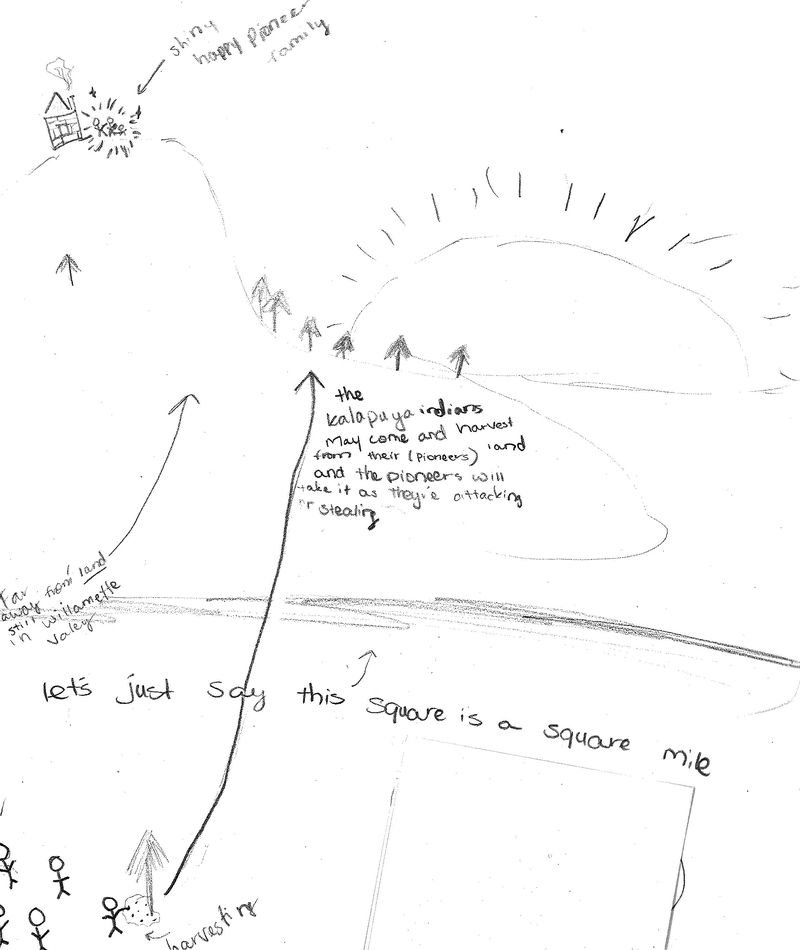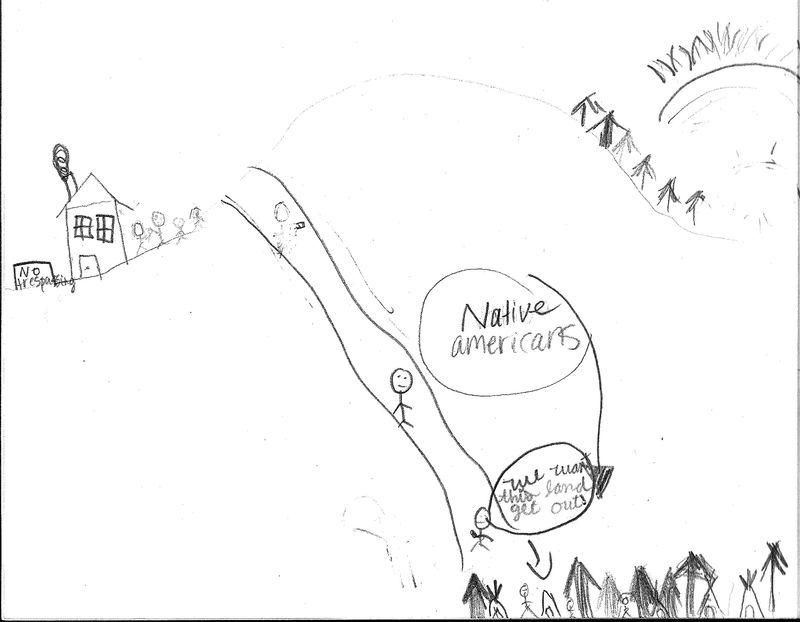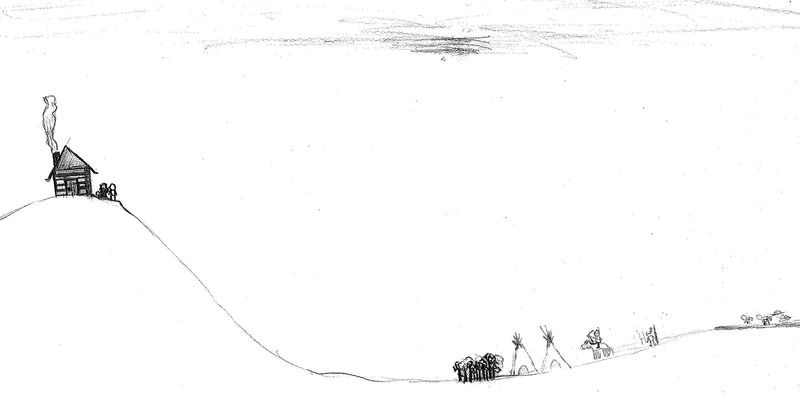Combatting the Single Story
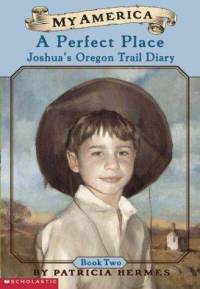
This week, I was introduced to a powerful TED talk by Novelist Chimamanda Adichie:
At Opal School, we take the opportunity and responsibility we have to combat the development of single stories very seriously. We begin our work to support habits of heart and mind that expect multiple points of view with Story Workshop (a structure we have developed and continue to research here at Opal School) and our very youngest children. Using materials and play and the languages of the arts, children in preschool through second grade learn to uncover, invent, and remember their own stories. And they learn to listen to the stories of others. They learn to gently interrogate the perspectives of others and to define their own with confidence and a sense of belonging. Their stories are integral to the life of the classrom. Without them, we have nothing.
As they get older, these habits of heart and mind become tools to think with about the stories of people more distant from us now. Here is a recent example, written by Opal 4 (ages 10 – 11) teacher Levia Friedman:
We finished our read aloud book, A Perfect Place.
This is how the book ended:
At sunset tonight, Pa was standing on the hill, looking over our land. He called Ma to him.
“Look, look there,” Pa said, pointing to the fields. His voice was soft, and I could just tell that his heart was up there crowding his throat.
I looked where he was pointing. The sky had flared up red, then turned purple and gray and pink. Tiny fruit trees were showing tiny green buds in the distance. Our house was behind us, the walls strong, smoke from the chimney poking up into the sky. Pa had his arm around Ma’s shoulder. Ma had Hector in her arms, and Becky was clinging to her skirt. All four of them stood there close together, sort of shiny-looking in the sunset.
It made my throat feel choked, too.
And I thought again of Grampa and what he’d said that time. And I knew he was right: Oregon is a real fine place to be.
(p. 98-99, A Perfect Place: Joshua’s Oregon Trail Diary by Particia Hermes)
Levia: What mental image does this leave you with?
TW: They are strong.
HH: They got through the bad and they got the good.
Levia: Are we supposed to think of them as heroes?
SBM: This book is supposed to teach kids history. The moral is to work through the hard things.
RC: You will be rewarded for your hard work.
Levia: Is this the story of Oregon?
MC: There were a ton of happy, shining people.
KB: You made it to Oregon. There were sad things along the way, but you made it. You have your land.
TW: They could be role models for other peeps that want to come. Other people will pass on the story.
Levia: What voices are missing in this story?
SBM: This book says nothing about other races.
Levia: Did they mention Indians in the book?
MM: Well, they mentioned that Joshua is afraid of them attacking him.
EY: If they were to come on your land they would shoot them.
Now that we had started to look critically at the mental image of the pioneer family on the hill, I invited the students to go back to their seats and draw based on this prompt:
Reflect on the image of the shiny, happy,
pioneer family on the hill.
What voices are missing?
Where can we find them?
KB: They’re visible of course, they’re not like a mile away. They’re real people, they weren’t actually invisible. They were big to them, but not in a good way. You can see them, they don’t want to.
HH: They want to stay. They are keeping their distance from the Indians. The Santiam Kalapuya wouldn’t go on their land. The pioneers think they will steal from them or hurt them.
DO: Where we would find missing voices? They weren’t allowed outside their square mile, that’s why I drew this. The voices are like, “shhh…” the people that are outcast by the shiny happy people. If we’ve claimed it, it’s our land. But, they were here first. The white people just have different laws, like planting the flag and making papers. These people didn’t know that. I have drawn what voices are missing and then figure out how to find them. I think it would be important to speak to Native tribes and talk to them. I bet they have it recorded somewhere.
ME: Camped out, hiding in trees, hiding from whites. They are afraid of the white people and the whites are afraid of them.
MG: It’s SO many people.
AW: Why are they scared?
MM: ‘Cause of assumptions. America is still not a very welcoming place.
SBM: We have to read REAL diaries, pioneer diaries. We can reverse it. See what the Native Americans – what the purpose of that was. Why were they doing that? If we do that, we will find a lot more truth. Joshua’s story is good, but it’s not the whole story. It would be totally amazing to have a diary from a Native American or from a Chinese American. It would probably be translated. I want it to sound real, not always be perfect. One person who kicked the Native Americans off. The pride and joy of “This is all mine!” I own this one mile.
TW: What voices are missing? African Americans, Chinese, Mexicans and others.
Where can we find them? Where ever they're welcomed to stay at and be greeted.
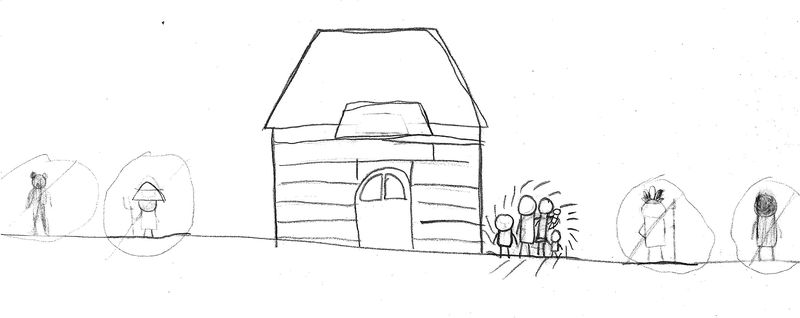
MC: So, this is so weird, but if you don’t get free land, you don’t get land at all.
Levia: Why is that? Who made that so?
MC: Yeah, really, who governs the land?
(pointing at the ground) Land, are you owned by this person?
(looking at me, confused) Who says that?
And some students went to the language of writing.
NF wrote from the perspective of a young Kalapuya girl:
I gather my things in a leather sack and sigh. Earlier, white people came and cut down our tribes’ trees. They are building a house without even a word. I’ve been watching them for more than a day now. Finally Chief Sophan said we were rolling and leaving and I had no power to argue. But inside my head I promise myself to come back.
The day of travel was long and tiresome, but we finally made it to a new reserve. I still can’t get over our constant moving! With whites taking over our places, our reserves, our homes, but why? We were here first, we were… I take a deep breath and exhale slowly. All this moving was driving me crazy. So that night I made up my mind. I creep out of bed and push the flaps of our teepee away. I take off on a run just the way we came. I finally made it to our old camp to see that whites had completely taken over. Then I realized that our home, our land, will never be the same again. And that frightened me. I’m just a normal Indian child. What else am I?
AW answered the questions in her writers notebook:
Reflect on the image of the “shiny” happy pioneer family on the hill.
So when I reflect or when I am going to reflect, I’m going to put myself in the perspective of them because if I don’t I will always take sides with the people who don’t get their voices heard…
So, if I was a pioneer, and I made a long journey all the way from Missouri, then I would probably want all of the land that I had signed for.
But, not very many people had encounters with the native tribes, so they were relying on the rumors of what they had heard.
What voices are missing?
I think the voices that are missing are the people who are judged by their skin color, religion, or people who can’t get land because of those reasons. The people who will be ignored, hurt and/or threatened when they try to defend themselves, and their people/tribes.
Where can we find them?
I think if we really think, and take time to wonder, and think where they would choose to be before they disturbed them. Where would they choose to be? Where would they choose? Where do the salmon jump? Where do the camas root grow? We have already encountered them many times but have we have just chosen not to.
The US Government is powerful and they just don’t know how to use it.


